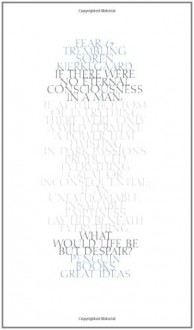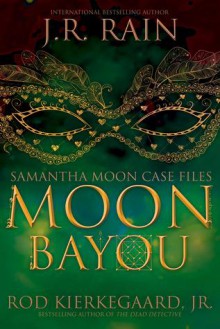 Kierkegaard is the single best writer I have ever come across. This audio version provides a particularly good presentation of the author's complex explanation for the world we live in and gives insights into why Kierkegaard is such a fascinating person worth reading even today. I don't believe in his conclusions, but I can appreciate a well written book and learn from it.
Kierkegaard is the single best writer I have ever come across. This audio version provides a particularly good presentation of the author's complex explanation for the world we live in and gives insights into why Kierkegaard is such a fascinating person worth reading even today. I don't believe in his conclusions, but I can appreciate a well written book and learn from it.There are multiple dimensions to the story. The author is supposedly telling the story of Abraham's sacrificing of Isaac to Jehovah and the multiple perspectives that are needed for understanding what is really going on. The author will say, "from the ethical point of view it is murder, but from the theological point of view it is an act of faith", and if you can't see the contradiction (the paradox) than you haven't thought sufficiently about the story, and he can "never understand but only admire" the Abraham story.
He says our authentic selves come from our passions, and he definitely would agree with this quote from Martin Luther "it is in vain to fashion a logic of faith". Our faith is not approachable through reason. According to the author, the highest we can attain is to be 'Knights of Faith" who cross over through the acceptance of "infinite resignation". We must doubt before we can become certain. All of our world we live in is built with myths that we have created, and at the creation of all myths there are contradictions (even with our current best understanding of physics with the double slit experiment and the Heisenberg uncertainty principal there will be a violation of the "mutually exclusive' principal of logic, the one Hegel describes as "likes do not exist").
There is a confounding of the world through our being finite (i.e. being is time and time is finite). The author says it is up to the individual Knight to complete their own world (the choice is up to you!). We are constantly surrounded by the absurd. By absurd Kierkegaard means both the contradiction from the paradoxes that surround us (e.g. our faith comes from our doubt) and the absurd existence we have while we are alive on earth because of "a sword that is always hanging above us" (that's a quote from this book, so he does have a very similar structure to Heidegger's "guilt' as presented in "Being and Time").
This book is a remarkably written book (I can't believe how good of a writer he is) and there are many different complex things (themes) that the author is trying to bring across. The biggest is the chasm between reason and faith. That our true selves come from our passions. The noise (idle chatter) that is everywhere distracts us from our potential. Love is our gateway to God. The particular (individuals) need to strive to rise above the universal and become the absolute in order to transcend the ethical and make a leap of faith. Few can become a Knight of Faith, but all can participate in the tasks of living to bring meaning through our desires.
The author is a very wise author. Theologians have done well in embracing this book. Those who want to understand our meaning for existence can gather insights from this book by realizing that our desire for living provides our starting point and the true understanding requires seeing our existence for the paradoxes that we live in.

 Log in with Facebook
Log in with Facebook 








